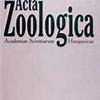Ferussina petofiana sp. n. (Gastropoda, Caenogastropoda, Cyclophoridae), the oldest representative of its subfamily from the Late Cretaceous of Romania
IF 0.8
4区 生物学
Q4 ZOOLOGY
Acta Zoologica Academiae Scientiarum Hungaricae
Pub Date : 2023-10-06
DOI:10.17109/azh.69.4.337.2023
引用次数: 0
Abstract
The terrestrial gastropod Ferussina petofiana Páll-Gergely sp. n. is described from uppermost Cretaceous (Maastrichtian) deposits from the Haţeg Basin, Romania. It represents the first properly diagnosed and described snail taxon from these deposits, despite numerous earlier reports of gastropod occurrences. This new species is characterized by a depressed, mostly smooth shell, three spiral carinae on the ventral side (inside the umbilicus), and an upward-turning aperture. The last feature characterizes two European fossil snail genera, the cyclophoroidean Ferussina, and the stylommatophoran Strophostomella. The new species is classified in the former group due to its nearly circular aperture, and the presence of conspicuous spiral carinae. In contrast, the aperture of most stylommatophoran genera (including Strophostomella) is semilunar, and if raised sculptural elements are present, they are mostly radially oriented. The identification of this new taxon in the uppermost Cretaceous of Romania represents an important range extension for the genus Ferussina, and adds it to the brief list of European clades that appear to have survived the mass extinction event at the Cretaceous-Paleogene boundary.Ferussina petofiana sp. n.(腹足目,腹足目,环足科),罗马尼亚晚白垩纪最古老的亚科代表
陆生腹足动物Ferussina petofiana Páll-Gergely sp. n.来自罗马尼亚Haţeg盆地白垩纪最上层(马astrichtian)沉积物。尽管有许多关于腹足动物的早期报道,但它代表了这些沉积物中第一个被正确诊断和描述的蜗牛分类群。这个新物种的特点是有一个凹陷的、光滑的外壳,腹部(在脐部内)有三个螺旋状的突起,以及一个向上旋转的孔。最后一个特征是两个欧洲化石蜗牛属,cyclophoroidean Ferussina和stylommatophoran Strophostomella。该新种因其近圆形的孔和明显的螺旋状突起而被归入前一类。相比之下,大多数柱头草属(包括Strophostomella)的孔是半月状的,如果存在凸起的雕塑元素,它们大多是径向的。在罗马尼亚白垩纪最上层发现的这一新分类单元代表了Ferussina属的重要范围扩展,并将其添加到白垩纪-古近纪边界大灭绝事件中幸存下来的欧洲分支的简要列表中。
本文章由计算机程序翻译,如有差异,请以英文原文为准。
求助全文
约1分钟内获得全文
求助全文
来源期刊
CiteScore
1.50
自引率
0.00%
发文量
26
审稿时长
>12 weeks
期刊介绍:
Acta Zoologica Academiae Scientiarum Hungaricae publishes original works in the fields of animal taxonomy and systematics, zoogeography, animal ecology and behaviour, population biology, biodiversity studies and nature conservation problems of international interest. Short communications, check lists, catalogues or new species records for a given region are not in focus of the scope of the journal.

 求助内容:
求助内容: 应助结果提醒方式:
应助结果提醒方式:


